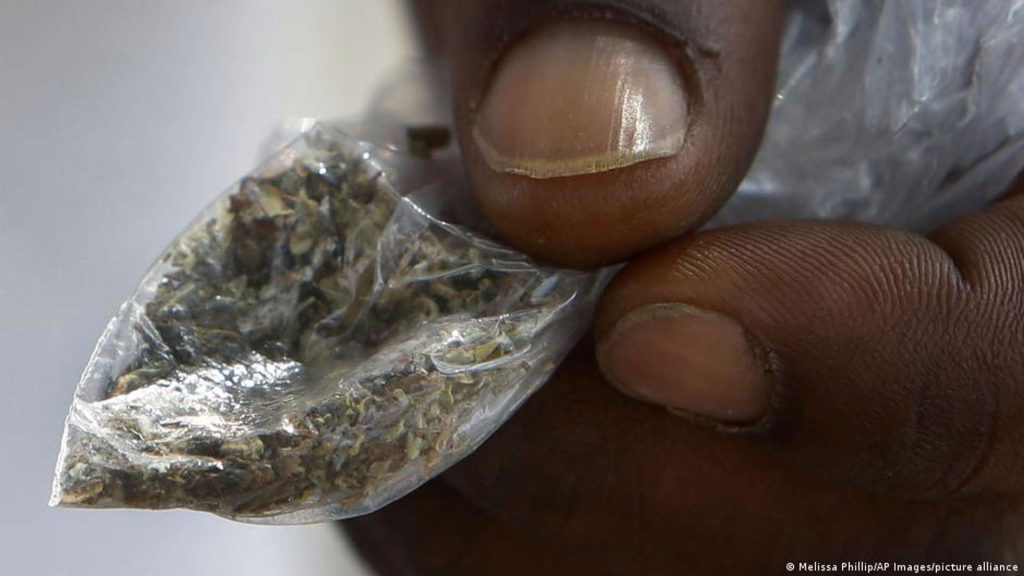Sierra Leone, Guinea and Liberia are grappling with an increasing number of young people becoming addicted to a substance known as kush or K2. The abuse of the drug has already killed several people in the region.
It’s a substance rolled up and smoked like a cigarette or cannabis. But with a few puffs, the consumer is left stoned, unable to stand upright.
But despite the drug’s aftereffects — which include falling, body injuries, and loss of self-esteem — the users still search for an opportunity for their next kush session.
“I’m addicted to a bad system but don’t frequently consume it,” one male kush addict in Sierra Leone’s capital, Freetown, told DW. “Instead, after a whole day, when I return home, I consume it to rest and sleep.”
He admitted that some of his friends encouraged him to try the drug.
“I smoke kush. When there was no kush, I smoked diamba [marijuana],” another user who chose to remain anonymous said.
“So I feel good and even dizzy. After I smoke and feel good, I take my one energy drink. That’s it! That thing requires cold water.”
Social media in Sierra Leone is awash with photos and video clips showing young men, including security officers, caught in embarrassing situations after consuming the drug.
“This newest drug called kush is rampant in Sierra Leonean communities,” Nyamacoro Sarata Silla, a retired nurse, told DW.
“When people have taken it, they present themselves in a very strange way. For example, they can be walking in the middle of the street and suddenly fall asleep standing up.”

Another addict struggling to quit the drug said it could lead to health complications — or even death.
“I work in the medical sector. I’m advising the young ones to stop taking it. But, even me, who takes it, it’s not good,” the young hospital worker told DW. He explained that he had seen somebody who died after taking kush.
“He had difficulty breathing and was on an oxygen machine, but he didn’t make it. The boy was only 15 years old,” he added.
As Sierra Leone prepares for national polls this year, there are concerns that the rate at which kush is consumed might lead to violence in the upcoming elections. But the Sierra Leone police say they have a proactive plan for that, according to assistant police superintendent, Brima Kamara.
“As we move on to elections 2023, we want them to be useful citizens; we want them to contribute to society,” Kamara told DW, adding that despite having the power to enforce the laws, they would also use the soft approach.
“We have to work collaboratively with other ministries, departments and agencies to see how we can possibly team up with them to ensure that we let these guys know that what they are doing is not right for them.”
He added that young people must avoid taking hard drugs if they want to live meaningful lives.
Sierra Leone’s neighbor, Guinea, is also battling to contain an increase in the consumption of kush. Authorities say that more than ten young men have died after taking the substance. Many others are undergoing medical treatments due to side effects.
“I smoked kush with one of my friends. We were taken to the hospital unconscious,” former kush addict Alpha Barry told DW.
“My friend was chewing his tongue until he died while we were at the hospital. So I’m warning the Guinean youth to avoid kush,” he pleaded.
“Kush is something that destroys a man. It kills and has killed many people in Guinea.”
Guinea and Sierra Leone share a porous border. Many Guineans blame Sierra Leonean drug traffickers for smuggling kush into the country.
Abdoulaye Sangare, a Guinean police officer working in the fight against drugs, said they had recently arrested four people suspected of trafficking 1,500 grams of kush in Guinea.
“Among those arrested are three Sierra Leoneans and one Guinean,” Sangare told DW. “If one gram can kill one individual, how many people would 1,500 grams kill?”
Sierra Leoneans living in Guinea now fear being stigmatized by the Guinean government and ordinary Guineans.
“The drug kush is a locally manufactured drug. What the Guinean authorities are failing to understand is that it can be manufactured in Sierra Leone, and it can be manufactured in Guinea too,” Joseph Kargbo, a senior member of the Sierra Leonean community in Guinea, told DW.
He urged Guinean authorities not to put all the blame on Sierra Leone but rather engage with parents and all stakeholders to sensitize the youth about the dangers posed by consuming kush.
Video Player is loading.
0






